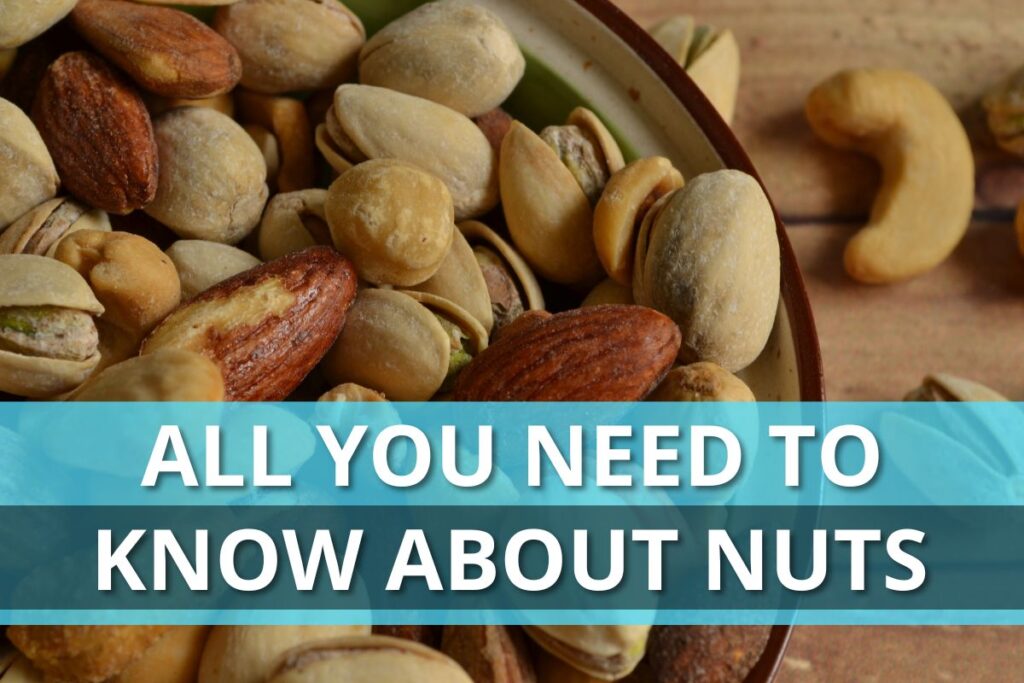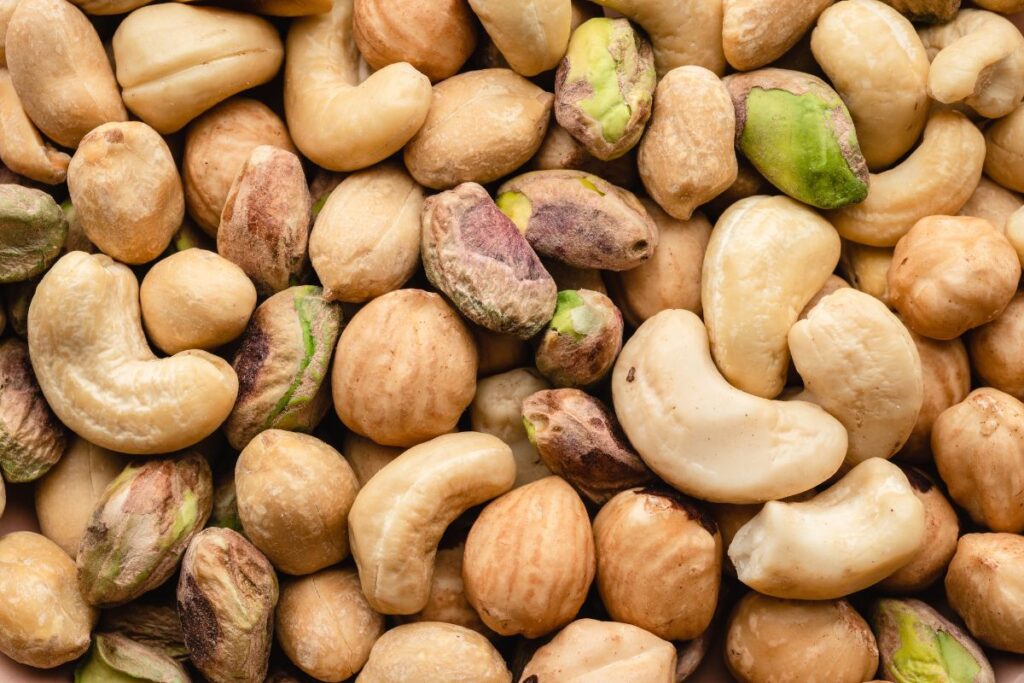All You Need To Know About Nuts
Author:
Unlock your full potential by engaging with our experts and community! Have questions about your fitness journey or looking for expert advice on weightlifting techniques? Don’t hesitate — leave a comment below and Sergii Putsov will provide a personalized answer and insights to help you reach your goals.
Torokhtiy is reader-supported. Some links are affiliate links, and we may earn a commission at no extra cost to you. See our disclosure page for details.

Nuts constitute a rich accumulation of beneficial nutrients. For a good reason there are numerous researches that have already demonstrated the positive impact caused by reasonable amounts of nuts consumption on health and lifespan.
Nuts contain high levels of unsaturated fatty acids and only modest content of saturated fatty acids (except for pili nut, brazil nut and macadamia nut). Walnuts are rich in omega-3 fatty acids in the form of alpha-linolenic acid. Also nuts are high vegetable protein (up to 26 gram of protein per 100 gram of the whole product) and carbohydrates source (15-30 grams per 100 grams of the whole product).
Nuts contain some of B-group vitamins, as well as vitamin K in some of them and vitamin E in the others. Nuts mineral profile includes non-heme iron, magnesium, potassium, zinc, selenium, calcium, copper, phosphorus, manganese. By the way, there is almost a complete absence of sodium in unsalted nuts which will definitely give some boost to your health.
In addition to all of the above, nuts are a valuable source of fiber and various phytochemicals, such as, for example, plant sterols that affect positively your health in general, and the levels of «bad» cholesterol in your blood in particular, lowering them.
You may like it:
Different kinds of nuts are rich on specific nutrients
Let’s take a brief look at different kinds of nuts and find out which of them are the best in specific macro- and micronutrients content:
- Almond – protein, fiber, calcium, magnesium, potassium, vitamin E.
- Cashew – protein, iron, magnesium, zinc, vitamin К.
- Pine nut – zinc, iron, magnesium, vitamin Е, vitamin К.
- Hazelnut – fiber, calcium, potassium, vitamin Е.
- Peanut – protein, calcium, potassium.
- Walnut – omega-3 fatty acids, calcium.
- Brazil nut – calcium, magnesium, zinc.
- Pistachio nut – protein, fiber, calcium, potassium.
- Macadamia nut – iron.
- Pecan – fiber.
Remember that one serving of nuts is approximately 30 grams.
Nuts offer an easy way to increase calories in your daily ration
Nuts used to be feared and excluded from the ration due to their high fat content and high calorie density as a result. As you may already know, nuts are marked not only for their high fats, but for high proteins and moderate carbohydrates as well. Fair amounts of these macronutrients – that’s what gives nuts such a great energy value. Remember that vitamins, minerals and other micronutrients don’t have any calories, and their high levels have nothing to do with high calories of nuts.
One serving of nuts is from 165 to 215 calories. If, for example, an athlete needs to get some gains, such high calorie density gives a significant advantage as it easily allows to increase daily ration calories without overeating. The most calorific nuts are macadamia nut, pecan, pine nut, brazilian nut, walnut and hazelnut. In addition to calories one serving of these nuts will provide you with a pleasant protein bonus (from 2 to 7 grams).
By the way, properly and thoroughly measured amounts of nuts are already included in our nutrition programs, and you only have to choose which one fits you and your goals the most (gaining muscles or weight loss).
Dried nuts are healthier than roasted ones

Often nuts are roasted to improve their taste and flavor, and also to make their texture crunchy. However, during the roasting process nuts lose a part of vitamins B, vulnerable to high temperature. Thus it is the first disadvantage of roasting nuts.
In the second place, high temperatures have a significant effect on composition of unsaturated fatty acids contained in nuts, damaging and oxidizing them. This can lead to the appearance of free radicals, which are able to harm cells that your body is made of. Oxidized, rancid fat adds a bitter taste and unpleasant odor to roasted nuts.
And third, there is a considerable amount of potentially carcinogenic chemical substance called acrylamide produced in nuts (especially in almonds) during the roasting process.
For all the foregoing reasons it is clear that nuts are better dried than roasted. By drying them you will get maximum nutritional benefits and no harm. If your itch for roasted nuts is irresistible, we recommend keeping temperature below the 265°F (130°C) point during this process.
Nuts can contain poisonous carcinogen aflatoxin
Aflatoxins are poisonous substances that are produced by certain kinds of mold fungus. In most cases poisoning occurs due to consumption of nuts and cereals that were stored or transported in high temperature and humidity conditions (that concerns tropical and subtropical areas the most).
Here are some WHO recommendations aimed at reducing aflatoxins consumption levels:
- Pay some time and thoroughly inspect nuts (and cereals) for the presence of mold and dispose of affected nuts, as well as bleached and wrinkled ones.
- Whenever possible buy fresh nuts that were grown in your area instead of those transported from afar.
- Buy nuts and nut butter made by a well-known manufacturer.
- Don’t store nuts for too long.
Ultimate tips on nuts consumption:
- You should necessarily include nuts in your daily ration as they are the wealth of beneficial nutrients and beyond that nuts are just delicious.
- If your desire is to make some muscle gains feel free to eat up to 2 servings of nuts per day. If you are trying to maintain your weight or aiming at body fat reduction, do not exceed 1 serving per day.
- Don’t eat the same nuts every day. Practice in diversity: pick up walnuts for today, almond for tomorrow, blend of various nuts for the next day and so on. Remember that each nut type contains a prevailing set of macro- and micronutrients and by combining them together we can extract the maximum good for our health.
- Try to eat dried nuts instead of roasted ones.
- Don’t purchase salty nuts and nut butter with salt or other additives. Look for the ones made from natural ingredients only.
- Carefully select nuts before buying them. They must have natural form and color. There should not be any mold. If nuts seem to be all right visually, but have a bitter taste or unpleasant odor, it is better to get rid of them.
Also keep in mind that peanuts and nuts are among the most common allergens, which can cause anaphylactic shock and even death. If you have an allergy, you’d better stay away from consuming nuts. Always remember to look through the labels of chocolate bars and other products which may contain some nuts pieces. Stay healthy.
You might be interested in:
Why Trust Us?
With over 20 years in Olympic weightlifting, strength training, nutrition coaching, and general fitness our team does its best to provide the audience with ultimate support and meet the needs and requirements of advanced athletes and professional lifters, as well as people who strive to open new opportunities and develop their physical capabilities with us.
By trusting the recommendations of our certified experts in coaching, nutrition, and sports training programming, as well as scientific consultants, and physiotherapists, we provide you with thorough, well-considered, and scientifically proven content. All the information given in the articles concerning workout programming, separate exercises, and athletic performance, in general, is based on verified data.
The product testing process is described in more detail here.
Author: Sergii Putsov
Head of Sport Science, PhD
Best Results: Snatch – 165 kg,
C&J – 200 kg
Sergii Putsov, Ph.D., is a former professional weightlifter and National team member, achieving multiple medals in the 94 kg weight category at national competitions. With a Master’s degree in “Olympic & Professional Sport Training” and a Sport Science Ph.D. from the International Olympic Academy, Greece, Sergii now leads as the Head of Sport Science. He specializes in designing training programs, writing insightful blog articles, providing live commentary at international weightlifting events, and conducting educational seminars worldwide alongside Olympic weightlifting expert Oleksiy Torokhtiy.




Still have questions after reading our article? Unlock your full potential by engaging with our experts and community! Don’t hesitate — leave a comment below and Sergii Putsov will provide a personalized answer and insights to help you reach your goals.